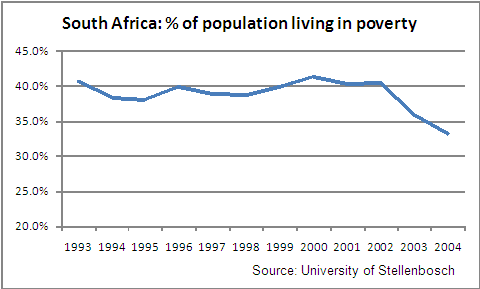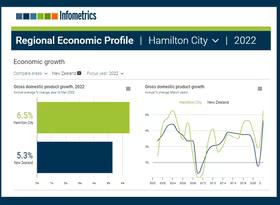Rugby, poverty, Apartheid, and Minto
John Minto’s decision to reject an award nomination from the South African government is hardly surprising. He is a doctrinaire socialist and is fundamentally at odds with the market-friendly policies pursued by the ruling African National Congress. Minto has sought to portray South Africa as an example of the failure of market-based policies to address poverty. To support his stance he has made some extraordinary claims about economic and social conditions in South Africa, some of which are quite simply wrong.
Minto claims to have been nominated for the Companions of O R Tambo Award in recognition of his role in Halt all Racist Tours (HART). Predictably, the South African government now denies an approach was made. If he had accepted the award Minto would have stood alongside great individuals such as Mahatma Gandhi and Martin Luther King.
Such an accolade would have been fitting. HART’s contribution to the struggle against Apartheid cannot be underestimated. With the Springboks deprived of facing their greatest rivals, the All Blacks, the sports boycott hit white South Africa where it hurt most. Unlike trade sanctions that negatively affected black workers, the sports boycott hurt those most likely to support the Apartheid regime.
Minto has clashed with the South African government on economic policy since the early days of democracy in the Republic. He harangued Nelson Mandela in Auckland in 1995 for not kicking private enterprise and transnational companies out of South Africa when Apartheid ended. Mandela and his successor, Thabo Mbeki, have a straightforward economic approach: get the fundamentals right, grow the economy and direct expanding government resources to the poor. They have reigned in inflation, turned a huge budget deficit into a surplus and bashed debt on the head. The economy is currently expanding at about 5% per annum and the country has enjoyed the longest period of uninterrupted economic growth since records began. Although employment growth was slow to get going, more than a million jobs were created in the five years to March 2007.
While Minto acknowledges the growth of the South African economy he believes that only a few have benefited from it. He claims that "extreme free market policies, wherever they are employed, shift wealth from the poor to the rich". This cannot be applied to South Africa where there has been a massive shift of fiscal resources to the poor. According to the doyen of South African poverty research, Professor Servaas van der Berg of Stellenbosch University, this shift is "unprecedented in any country in the world that has not undergone a political revolution". The roll out of hard services to the poor is remarkable. 1.6 million houses and 700 clinics have been built; piped water has been brought to 17 million people, sanitation to 7million. Teachers and educational resources have been shifted to poorer schools on a massive scale.
These statistics flatly contradict Minto’s assertion that "economically and socially, black people are worse off today than they were under white rule". He quotes a statistic that the number of South Africans living on less than a dollar a day has doubled in the past ten years. That statistic was derived from a crude model which incorporated some incorrect assumptions and should never have been published. Not even the author would defend it today. But it managed to make it into a news report and is now quoted around the world. Considerably more robust research shows that income poverty rates have declined substantially since 1994 (see chart).
The government’s biggest assault on poverty was a 70% increase in social grants to the poor earlier this decade – mostly in the form of child support grants. The increase amounted to about NZ$4 billion per annum. This amount is not far short of what economists term the poverty gap – the total annual transfer required to lift the income of all poor households up to the poverty line. Today almost 12 million South Africans receive social grants.
Minto is a courageous man and has shown a rare ability among activists to consistently stand by his principles. He challenges injustice, irrespective of the perpetrator’s colour. But his recent attacks on the South African government are off the mark. If Minto had turned down his nomination on the basis of moral decay within the ANC, their apparent indifference to corruption, their ineffectual policies for dealing with AIDS or Mbeki’s tacit support for Robert Mugabe it may have been understandable. But challenging them on their record of improving the lives of the poor does not stack up.





